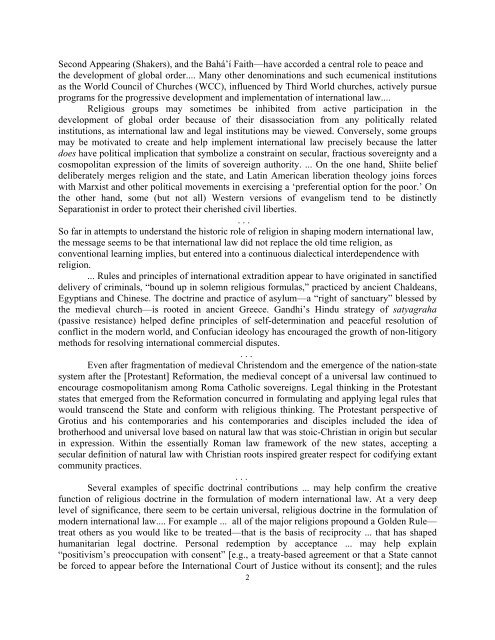International Legal Evangelism: Intelligence, Reconnaissance & Missions
International Legal Evangelism: Intelligence, Reconnaissance & Missions
International Legal Evangelism: Intelligence, Reconnaissance & Missions
You also want an ePaper? Increase the reach of your titles
YUMPU automatically turns print PDFs into web optimized ePapers that Google loves.
Second Appearing (Shakers), and the Bahá’í Faith—have accorded a central role to peace and<br />
the development of global order.... Many other denominations and such ecumenical institutions<br />
as the World Council of Churches (WCC), influenced by Third World churches, actively pursue<br />
programs for the progressive development and implementation of international law....<br />
Religious groups may sometimes be inhibited from active participation in the<br />
development of global order because of their disassociation from any politically related<br />
institutions, as international law and legal institutions may be viewed. Conversely, some groups<br />
may be motivated to create and help implement international law precisely because the latter<br />
does have political implication that symbolize a constraint on secular, fractious sovereignty and a<br />
cosmopolitan expression of the limits of sovereign authority. ... On the one hand, Shiite belief<br />
deliberately merges religion and the state, and Latin American liberation theology joins forces<br />
with Marxist and other political movements in exercising a ‘preferential option for the poor.’ On<br />
the other hand, some (but not all) Western versions of evangelism tend to be distinctly<br />
Separationist in order to protect their cherished civil liberties.<br />
. . .<br />
So far in attempts to understand the historic role of religion in shaping modern international law,<br />
the message seems to be that international law did not replace the old time religion, as<br />
conventional learning implies, but entered into a continuous dialectical interdependence with<br />
religion.<br />
... Rules and principles of international extradition appear to have originated in sanctified<br />
delivery of criminals, “bound up in solemn religious formulas,” practiced by ancient Chaldeans,<br />
Egyptians and Chinese. The doctrine and practice of asylum—a “right of sanctuary” blessed by<br />
the medieval church—is rooted in ancient Greece. Gandhi’s Hindu strategy of satyagraha<br />
(passive resistance) helped define principles of self-determination and peaceful resolution of<br />
conflict in the modern world, and Confucian ideology has encouraged the growth of non-litigory<br />
methods for resolving international commercial disputes.<br />
. . .<br />
Even after fragmentation of medieval Christendom and the emergence of the nation-state<br />
system after the [Protestant] Reformation, the medieval concept of a universal law continued to<br />
encourage cosmopolitanism among Roma Catholic sovereigns. <strong>Legal</strong> thinking in the Protestant<br />
states that emerged from the Reformation concurred in formulating and applying legal rules that<br />
would transcend the State and conform with religious thinking. The Protestant perspective of<br />
Grotius and his contemporaries and his contemporaries and disciples included the idea of<br />
brotherhood and universal love based on natural law that was stoic-Christian in origin but secular<br />
in expression. Within the essentially Roman law framework of the new states, accepting a<br />
secular definition of natural law with Christian roots inspired greater respect for codifying extant<br />
community practices.<br />
. . .<br />
Several examples of specific doctrinal contributions ... may help confirm the creative<br />
function of religious doctrine in the formulation of modern international law. At a very deep<br />
level of significance, there seem to be certain universal, religious doctrine in the formulation of<br />
modern international law.... For example ... all of the major religions propound a Golden Rule—<br />
treat others as you would like to be treated—that is the basis of reciprocity ... that has shaped<br />
humanitarian legal doctrine. Personal redemption by acceptance ... may help explain<br />
“positivism’s preoccupation with consent” [e.g., a treaty-based agreement or that a State cannot<br />
be forced to appear before the <strong>International</strong> Court of Justice without its consent]; and the rules<br />
2

















